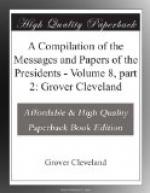It does not occur that the inspection of the papers asked for can be relative to any purpose under the cognizance of the House of Representatives, except that of an impeachment, which the resolution has not expressed. I repeat that I have no disposition to withhold any information which the duty of my station will permit or the public good shall require to be disclosed; and, in fact, all the papers affecting the negotiation with Great Britain were, laid before the Senate when the treaty itself was communicated for their consideration and advice.
The course which the debate has taken on the resolution of the House leads to some observations on the mode of making treaties under the Constitution of the United States.
Having been a member of the General Convention, and knowing the principles on which the Constitution was formed, I have ever entertained but one opinion on this subject; and from the first establishment of the Government to this moment my conduct has exemplified that opinion—that the power of making treaties is exclusively vested in the President, by and with the advice and consent of the Senate, provided two-thirds of the Senators present concur; and that every treaty so made and promulgated thenceforward became the law of the land. It is thus that the treaty-making power has been understood by foreign nations, and in all the treaties made with them we have declared and they have believed that, when ratified by the President, with the advice and consent of the Senate, they became obligatory. In this construction of the Constitution every House of Representatives has heretofore acquiesced, and until the present time not a doubt or suspicion has appeared, to my knowledge, that this construction was not the true one. Nay, they have more than acquiesced; for till now, without controverting the obligation of such treaties, they have made all the requisite provisions for carrying them into effect.
There is also reason to believe that this construction agrees with the opinions entertained by the State conventions when they were deliberating on the Constitution, especially by those who objected to it because there was not required in commercial treaties the consent of two-thirds of the whole number of the members of the Senate instead of two-thirds of the Senators present, and because in treaties respecting territorial and certain other rights and claims the concurrence of three-fourths of the whole number of the members of both Houses, respectively, was not made necessary.




